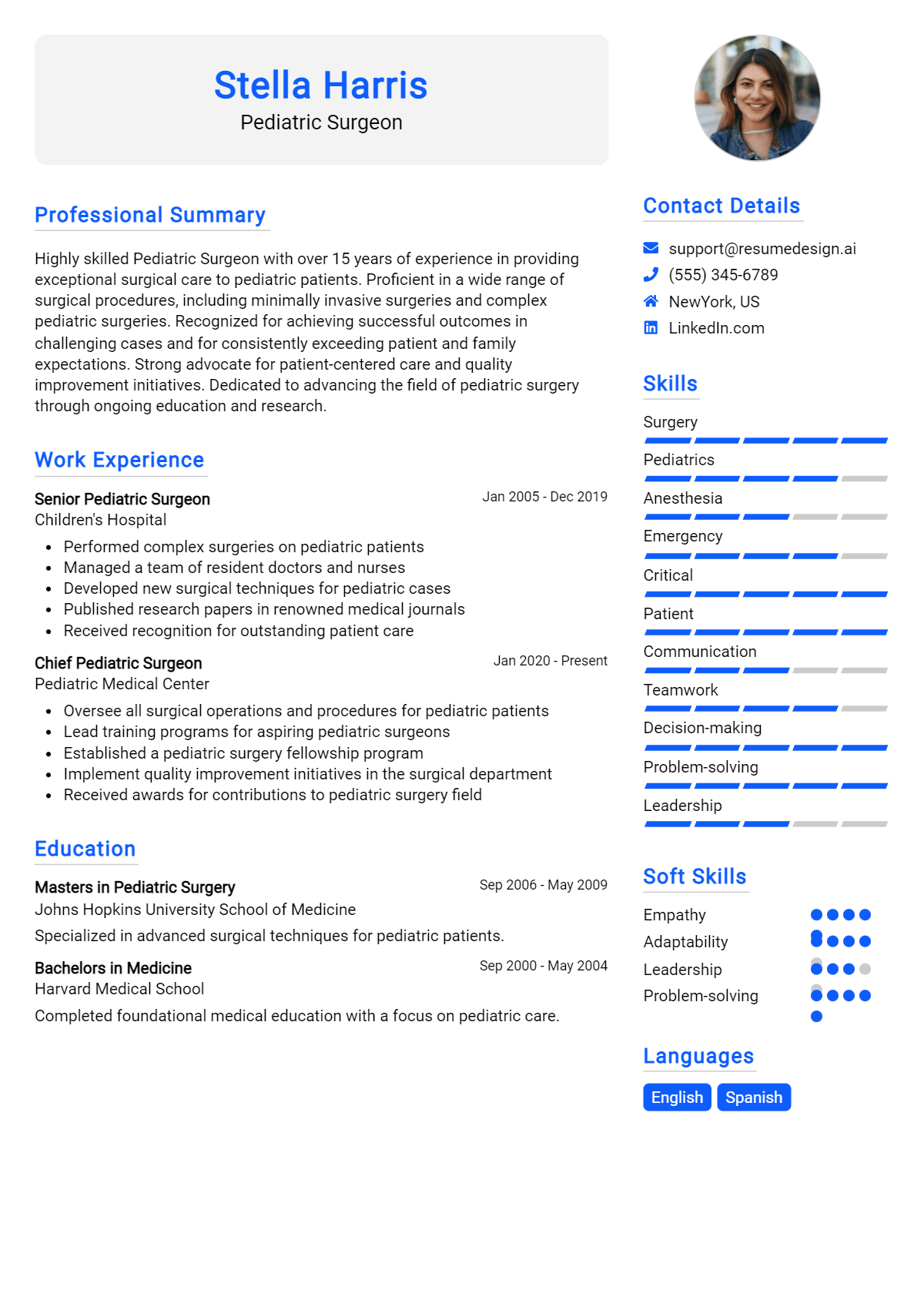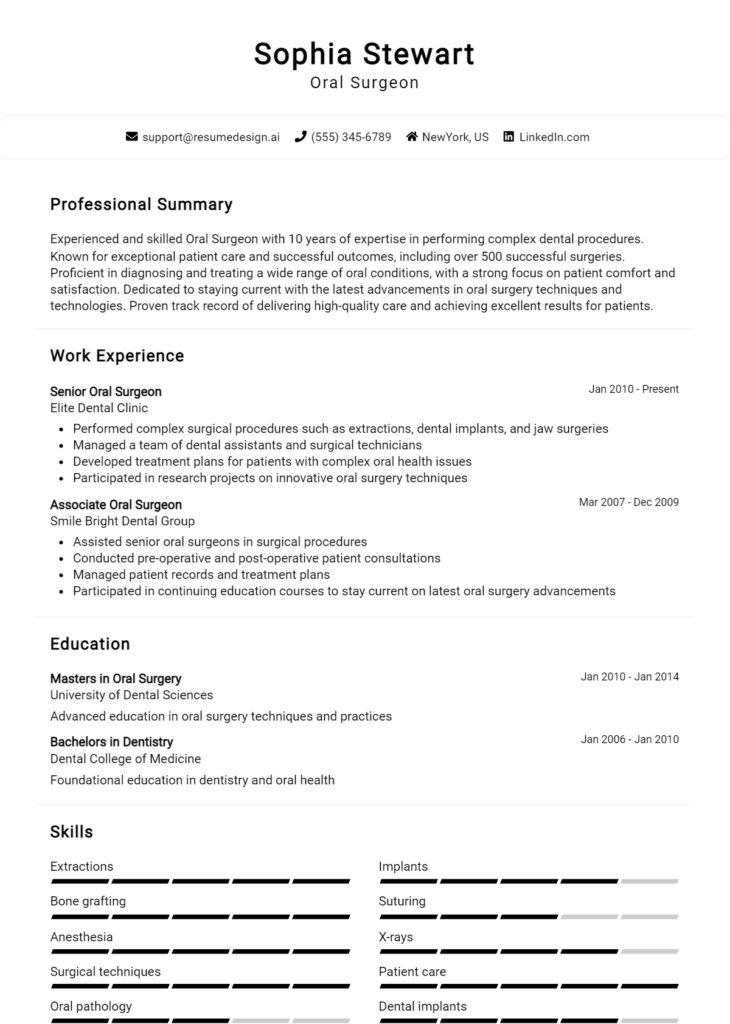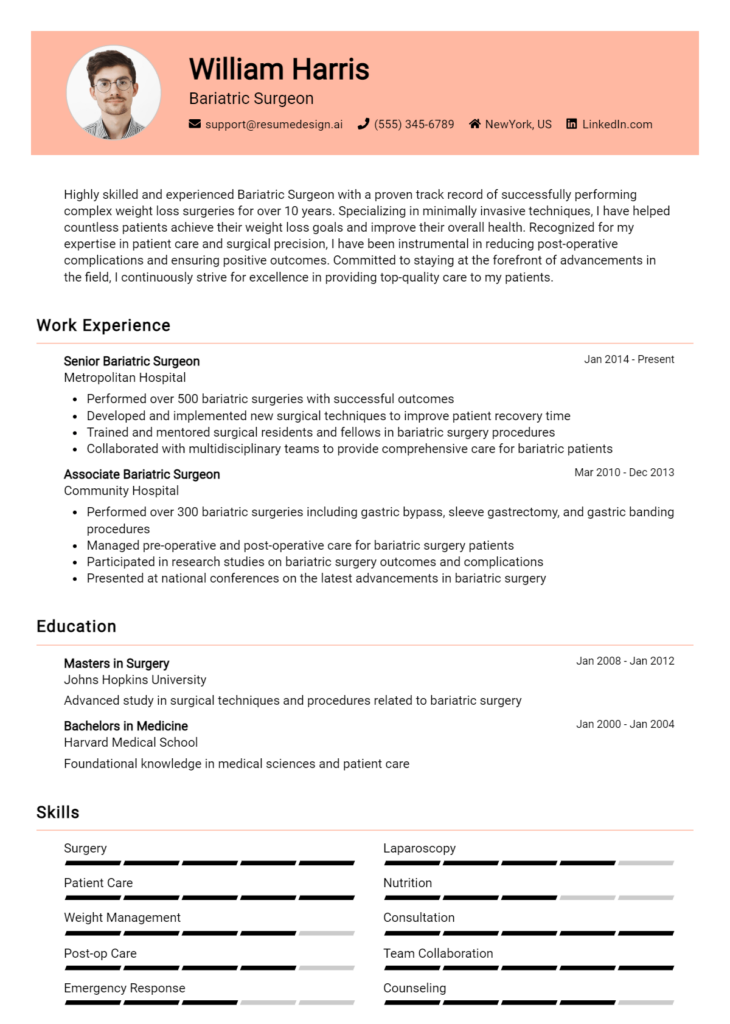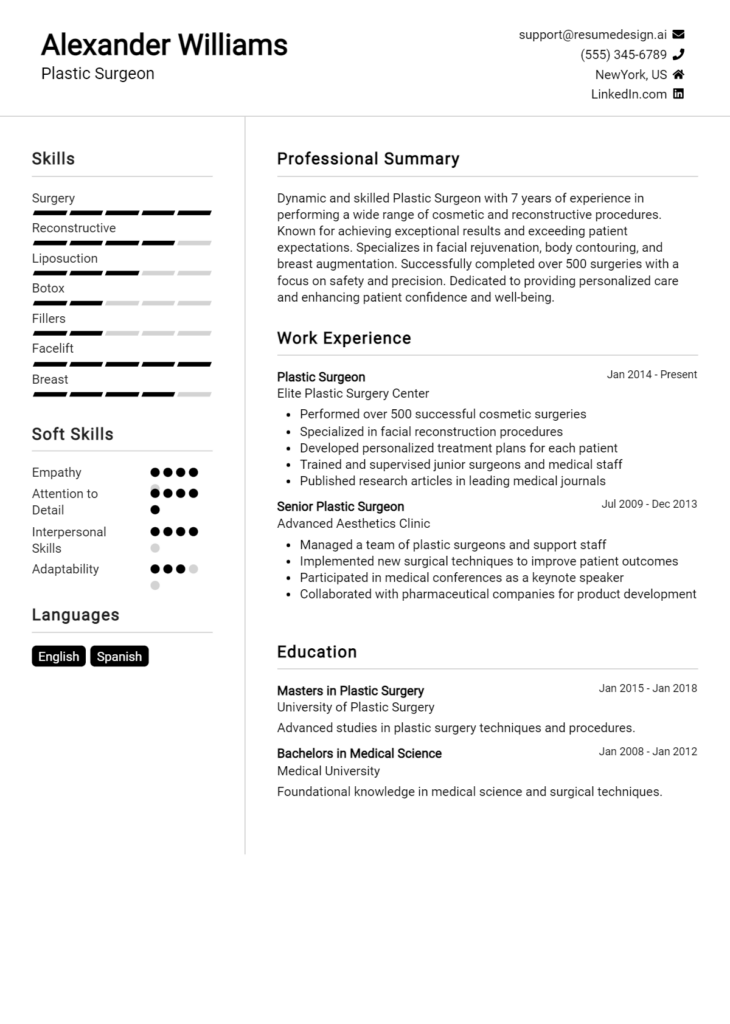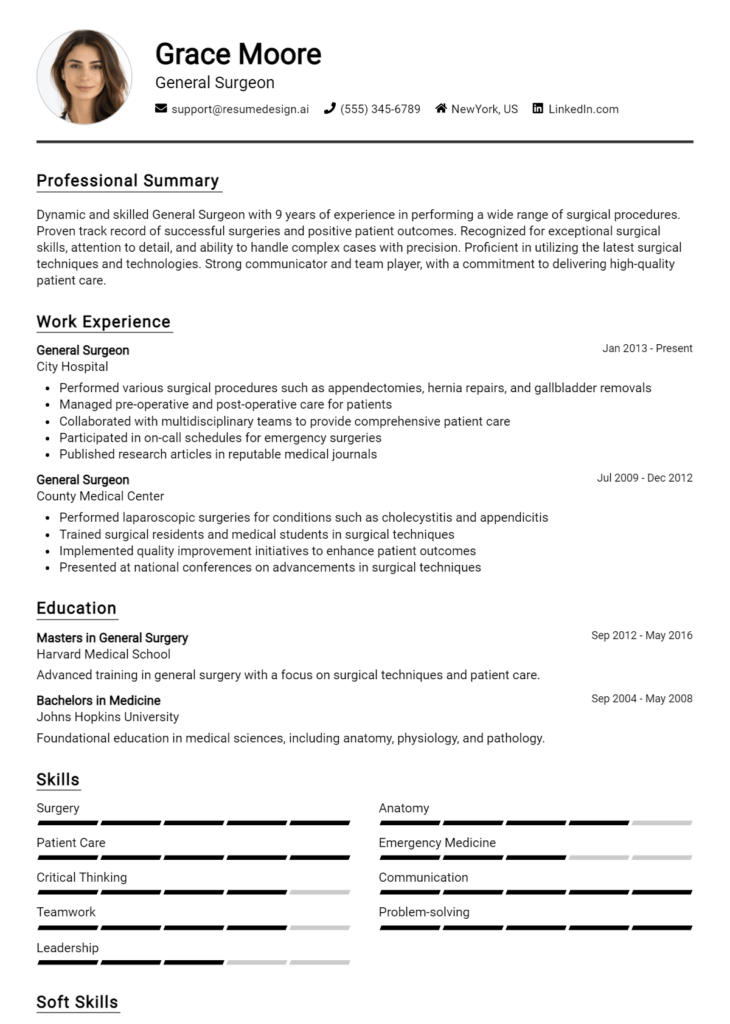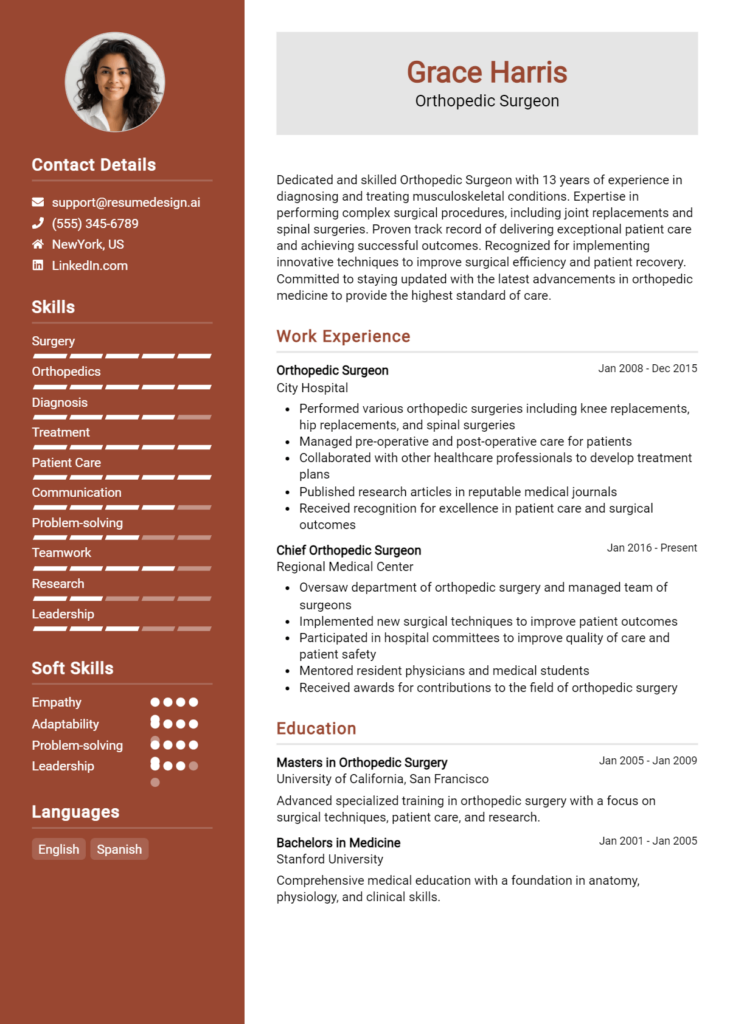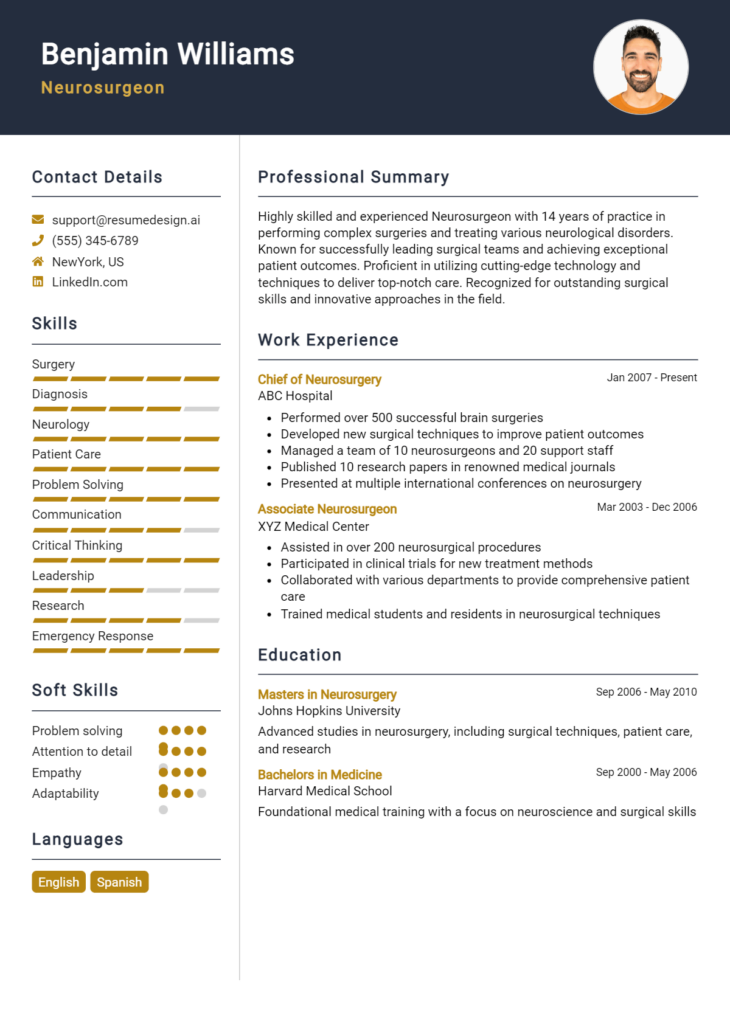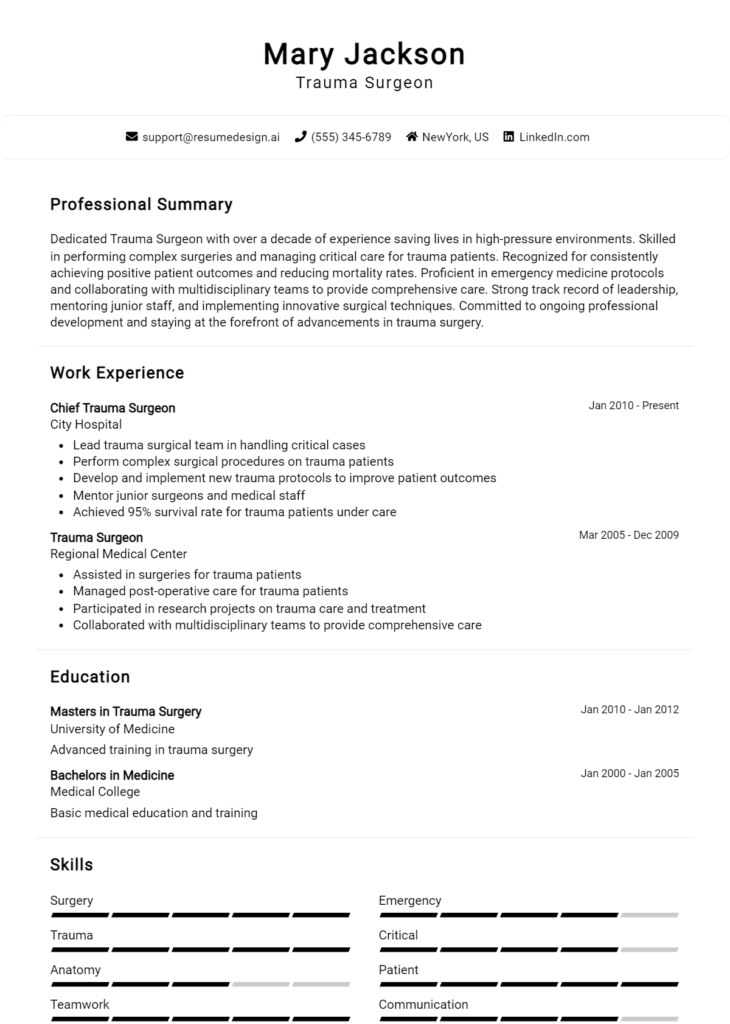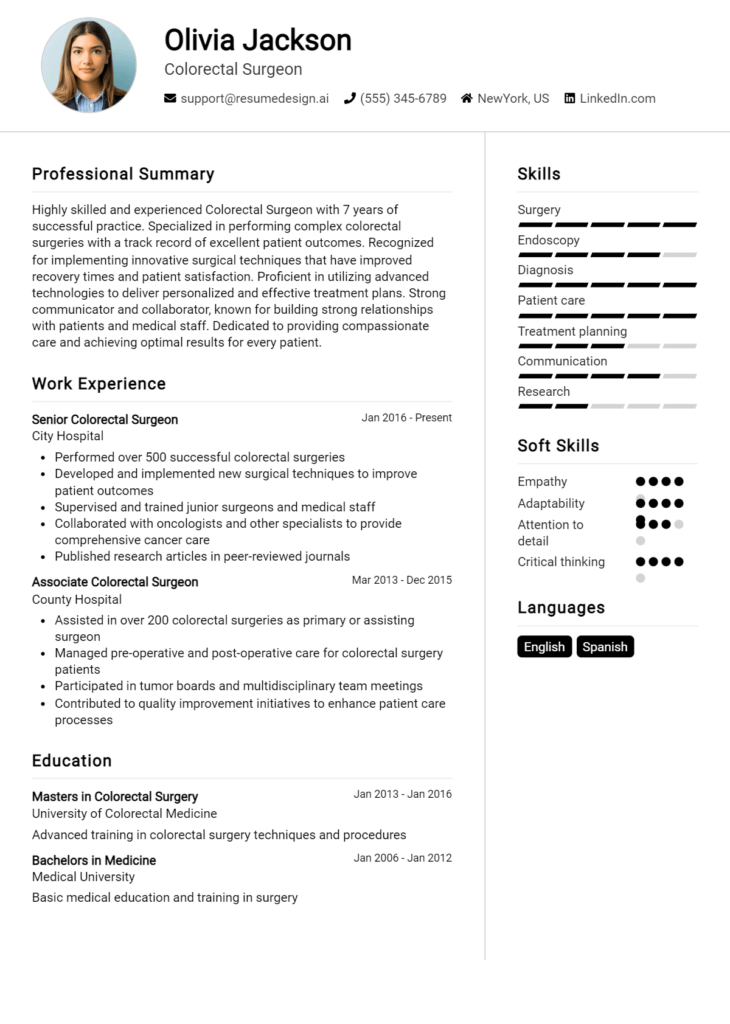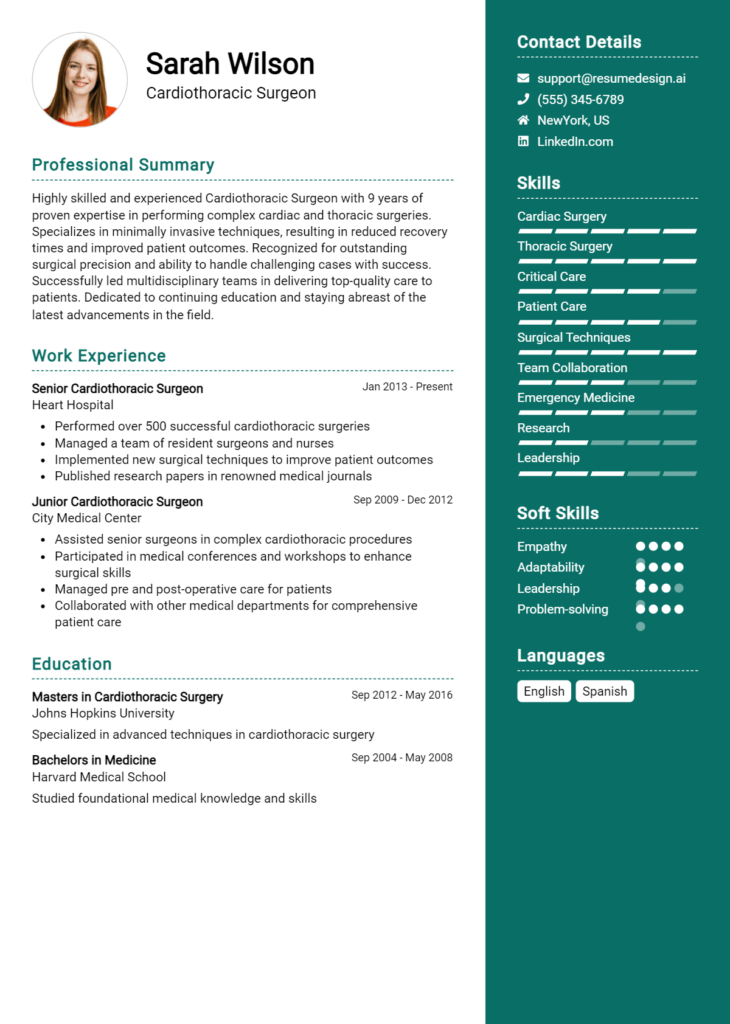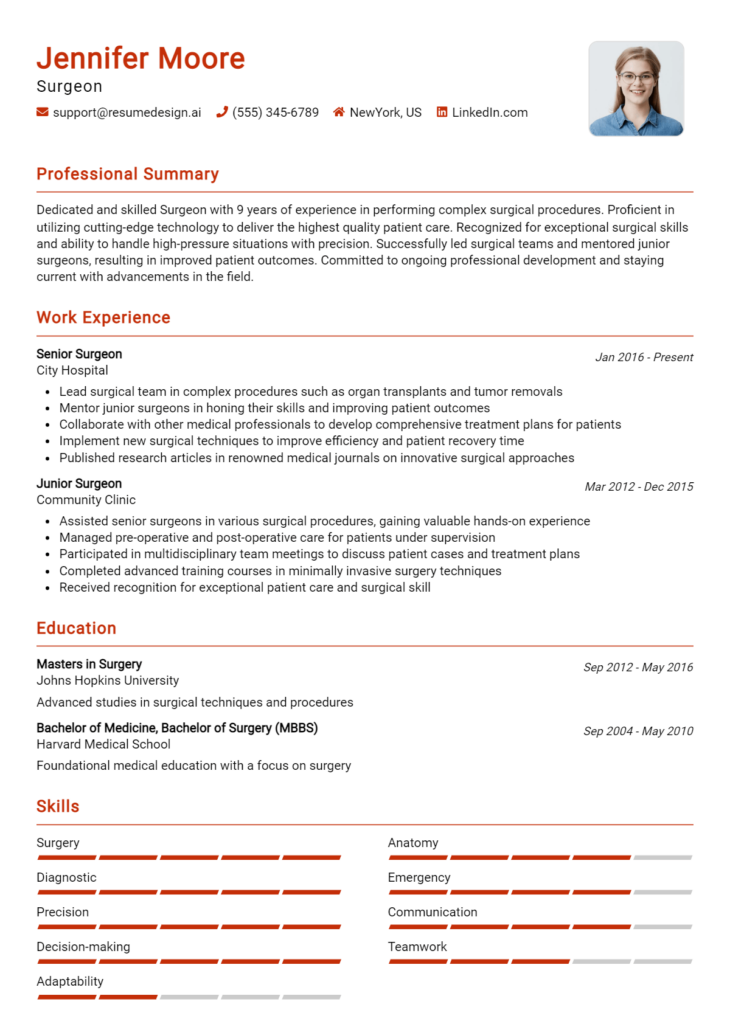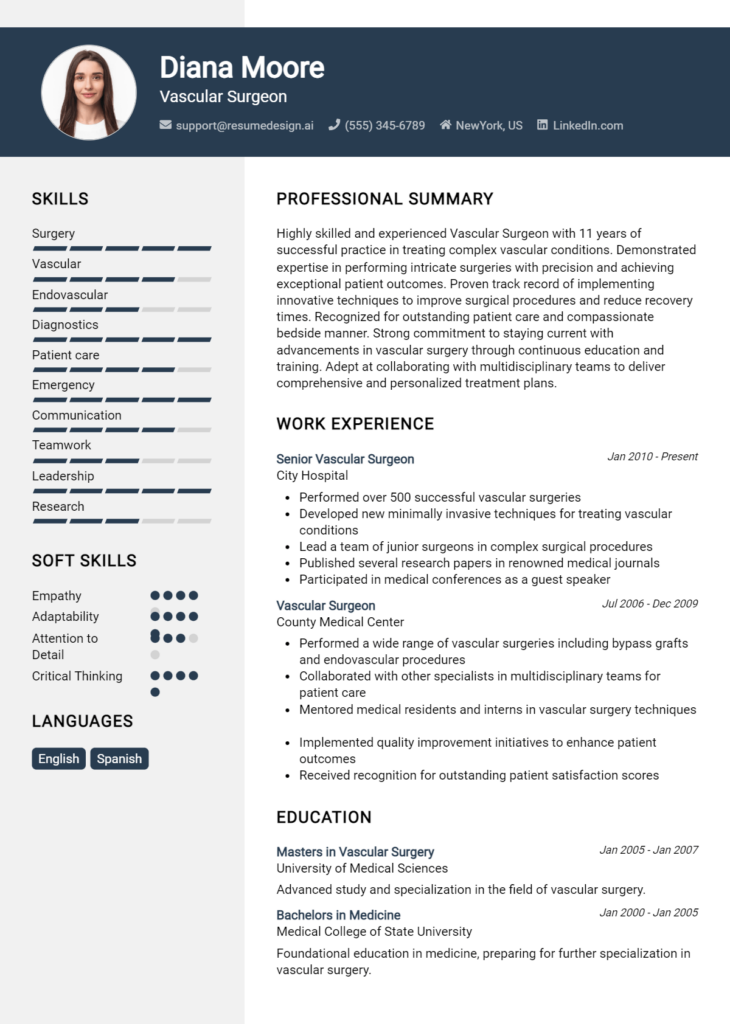Pediatric Surgeon Core Responsibilities
A Pediatric Surgeon is responsible for diagnosing and treating surgical conditions in infants, children, and adolescents. This role requires exceptional technical skills in surgery, operational efficiency in managing surgical teams, and strong problem-solving abilities to address complex medical issues. Pediatric Surgeons often collaborate with various departments, including pediatrics, anesthesia, and nursing, ensuring comprehensive patient care. A well-structured resume highlighting these core competencies is essential for showcasing qualifications and aligning with the organization’s overall goals.
Common Responsibilities Listed on Pediatric Surgeon Resume
- Perform complex surgical procedures on pediatric patients.
- Conduct pre-operative assessments and post-operative care.
- Collaborate with multidisciplinary healthcare teams.
- Provide consultations and second opinions for pediatric patients.
- Develop and implement treatment plans tailored to individual needs.
- Monitor patient recovery and manage complications.
- Educate patients and families about surgical procedures and care.
- Maintain detailed and accurate medical records.
- Stay updated on advancements in pediatric surgery techniques.
- Participate in research and clinical trials.
- Train and mentor medical residents and surgical teams.
- Advocate for pediatric patients' health and wellbeing.
High-Level Resume Tips for Pediatric Surgeon Professionals
A well-crafted resume is crucial for Pediatric Surgeon professionals, as it serves as the first impression a candidate makes on potential employers. In such a competitive field, your resume must not only reflect your exceptional skills and achievements but also convey your passion for pediatric healthcare. This guide aims to provide practical and actionable resume tips specifically tailored for Pediatric Surgeon professionals, ensuring that your application stands out in a crowded job market.
Top Resume Tips for Pediatric Surgeon Professionals
- Tailor your resume to each job description by incorporating relevant keywords and phrases from the listing.
- Highlight your medical education, including your residency and any fellowships, emphasizing training specific to pediatric surgery.
- Showcase your relevant experience, detailing your roles in pediatric surgical procedures, patient care, and teamwork in multidisciplinary settings.
- Quantify your achievements by including metrics such as the number of successful surgeries performed or patient satisfaction scores.
- Include certifications, licensure, and professional affiliations that are pertinent to pediatric surgery, such as board certifications.
- Highlight your soft skills, such as communication, empathy, and teamwork, which are crucial in working with children and their families.
- Utilize a clean and professional format that enhances readability, ensuring key information stands out.
- Incorporate a strong summary statement that encapsulates your career goals and what you bring to the role of a Pediatric Surgeon.
- Keep your resume concise, ideally one to two pages, focusing on the most relevant and impactful information.
By implementing these resume tips, Pediatric Surgeon professionals can significantly increase their chances of landing a job in a highly specialized and competitive field. A well-organized and tailored resume not only showcases your credentials but also conveys your commitment to providing exceptional care to young patients, ultimately making you a more attractive candidate to potential employers.
Why Resume Headlines & Titles are Important for Pediatric Surgeon
In the competitive field of pediatric surgery, having a well-crafted resume is essential for standing out among numerous qualified candidates. Resume headlines and titles serve as a crucial first impression, offering hiring managers a quick glimpse into a candidate's qualifications and suitability for the role. A strong headline can immediately capture attention, summarizing a candidate's expertise, experience, and unique skills in a succinct and impactful manner. It is important for the headline to be concise, relevant, and specifically tailored to the pediatric surgery position being applied for, ensuring clarity and focus right from the start.
Best Practices for Crafting Resume Headlines for Pediatric Surgeon
- Keep it concise: Aim for one impactful phrase that encapsulates your expertise.
- Be role-specific: Use terminology that reflects the pediatric surgery field to demonstrate relevance.
- Highlight key qualifications: Focus on your strongest skills or accomplishments that align with the job description.
- Use powerful language: Choose action verbs and descriptive words that evoke confidence and professionalism.
- Tailor for each application: Customize your headline for each position to address specific requirements or goals of the employer.
- Include years of experience: If applicable, incorporate your years of experience to add credibility.
- Avoid jargon: While medical terms are relevant, ensure the language is accessible to HR professionals who may not have a clinical background.
- Stay positive: Frame your qualifications in a positive light to convey confidence and capability.
Example Resume Headlines for Pediatric Surgeon
Strong Resume Headlines
Board-Certified Pediatric Surgeon with 10+ Years of Experience in Minimally Invasive Techniques
Compassionate Pediatric Surgeon Specializing in Complex Congenital Anomalies and Patient-Centered Care
Dedicated Pediatric Surgeon Committed to Advancing Surgical Techniques and Enhancing Patient Outcomes
Weak Resume Headlines
Surgeon Looking for Work
Experienced Medical Professional
The strong headlines are effective because they clearly communicate the candidate's specialized skills, years of experience, and commitment to the field of pediatric surgery, making them immediately relevant to potential employers. In contrast, the weak headlines fail to impress due to their vagueness and lack of specificity; they do not highlight what sets the candidate apart, ultimately making them less memorable and engaging for hiring managers.
Writing an Exceptional Pediatric Surgeon Resume Summary
Crafting an exceptional resume summary is crucial for a Pediatric Surgeon, as it serves as the first impression for hiring managers. A well-written summary quickly captures attention by succinctly showcasing key skills, relevant experience, and notable accomplishments that align with the job role. By presenting a compelling overview of one's professional background, a strong summary not only highlights the candidate's qualifications but also sets the stage for the rest of the resume. It should be concise, impactful, and tailored to the specific job the candidate is applying for, making it a vital component in the competitive field of pediatric surgery.
Best Practices for Writing a Pediatric Surgeon Resume Summary
- Quantify achievements where possible; use numbers to demonstrate your impact.
- Focus on key skills that are directly relevant to the pediatric surgery field.
- Tailor your summary to match the specific job description and requirements.
- Highlight relevant certifications and specialized training.
- Use action verbs to convey a sense of proactivity and effectiveness.
- Keep it concise, ideally within 3-5 sentences.
- Showcase your passion for pediatric care and commitment to patient outcomes.
- Incorporate keywords from the job posting to improve visibility.
Example Pediatric Surgeon Resume Summaries
Strong Resume Summaries
Compassionate and experienced Pediatric Surgeon with over 10 years in performing complex surgical procedures on infants and children. Successfully reduced post-operative complications by 30% through meticulous pre-operative planning and patient education.
Dedicated Pediatric Surgeon with a fellowship in Pediatric Trauma Surgery, performing over 500 surgeries annually. Recognized for excellence in minimally invasive techniques that have improved recovery times by an average of 15 days.
Board-certified Pediatric Surgeon with a strong background in congenital heart defects. Led a pediatric surgical team that achieved a 95% success rate in high-risk surgeries, earning accolades from the hospital administration for outstanding patient care.
Weak Resume Summaries
Experienced surgeon looking for a position in a hospital.
Pediatric Surgeon with some experience in surgeries and patient care.
The strong resume summaries are effective because they provide specific examples of the candidate's accomplishments and skills, using quantifiable results that demonstrate their impact in previous roles. They are tailored to the pediatric surgery field and clearly convey the candidate's expertise and commitment. In contrast, the weak summaries lack detail and specificity, making them too generic and unremarkable, which fails to capture the attention of hiring managers.
Work Experience Section for Pediatric Surgeon Resume
The work experience section of a Pediatric Surgeon resume is crucial as it serves as a detailed showcase of the candidate's technical skills, leadership abilities, and commitment to delivering high-quality surgical care. This section allows candidates to illustrate their expertise in pediatric surgery, their experience in managing surgical teams, and their capability to achieve significant outcomes in patient care. Quantifying achievements—such as the number of successful surgeries performed, the improvement in patient recovery times, or the reduction of complication rates—helps to align the candidate's experience with industry standards, making their profile more compelling to potential employers.
Best Practices for Pediatric Surgeon Work Experience
- Detail specific surgical procedures performed, including the types of surgeries and patient demographics.
- Quantify achievements with metrics such as success rates, patient outcomes, or number of surgeries completed.
- Highlight leadership roles in surgical teams and collaborative projects with multidisciplinary teams.
- Include continuing education and training in new surgical techniques or technologies.
- Demonstrate involvement in research or clinical trials that have advanced pediatric surgical practices.
- Showcase community involvement or outreach programs related to pediatric health and surgery.
- Use action verbs to convey impact and initiative in previous roles.
- Ensure alignment with the latest industry standards and practices in pediatric surgery.
Example Work Experiences for Pediatric Surgeon
Strong Experiences
- Performed over 350 pediatric surgeries annually, achieving a 98% success rate and significantly reducing post-operative complications.
- Led a team of 10 surgical staff in a high-volume children’s hospital, improving efficiency by 30% through optimized surgical workflows.
- Implemented a novel minimally invasive surgical technique that decreased patient recovery time by 25% and reduced hospital stay lengths.
- Collaborated with a multidisciplinary team to develop a community outreach program, increasing access to pediatric surgical care for underserved populations by 40%.
Weak Experiences
- Assisted in pediatric surgeries as part of a team.
- Worked at a hospital with general pediatric patients.
- Participated in meetings regarding surgical practices.
- Involved in various surgeries without specific details or outcomes.
The examples labeled as strong demonstrate clear, quantifiable results and specific contributions to pediatric surgery, highlighting the candidate's technical expertise and leadership. In contrast, the weak experiences lack detail, metrics, and impact, making them less impressive to potential employers. Strong experiences convey a clear narrative of success and expertise, while weak experiences are vague and fail to showcase the candidate's true capabilities in the field.
Education and Certifications Section for Pediatric Surgeon Resume
The education and certifications section of a Pediatric Surgeon resume is crucial for showcasing a candidate's academic background and professional qualifications. This section not only highlights the rigor of their medical training but also emphasizes their commitment to continuous learning and specialization in pediatric surgery. By listing relevant coursework, certifications, and any specialized training, candidates can greatly enhance their credibility and demonstrate their alignment with the demands of the role. A well-crafted education and certifications section provides hiring managers with confidence in the candidate's expertise and readiness to handle the complexities of pediatric surgical procedures.
Best Practices for Pediatric Surgeon Education and Certifications
- Include only relevant degrees and certifications that pertain directly to pediatric surgery.
- List advanced degrees such as MD or DO prominently to establish a strong academic foundation.
- Highlight board certifications in pediatric surgery to demonstrate recognized expertise.
- Detail any specialized training or fellowships that enhance clinical skills specific to the pediatric population.
- Incorporate relevant coursework that showcases knowledge in pediatric medicine, anatomy, and surgical techniques.
- Use clear and concise formatting for easy readability, ensuring that key credentials stand out.
- Update this section regularly to reflect any new certifications or ongoing education.
- Consider including memberships in professional organizations related to pediatric surgery as a sign of commitment to the field.
Example Education and Certifications for Pediatric Surgeon
Strong Examples
- Doctor of Medicine (MD), Harvard Medical School, 2015
- Board Certified in Pediatric Surgery, American Board of Surgery, 2018
- Pediatric Surgery Fellowship, Children's Hospital of Philadelphia, 2019
- Relevant Coursework: Pediatric Anatomy, Surgical Techniques in Pediatrics, Pediatric Critical Care
Weak Examples
- Bachelor of Arts in English Literature, University of California, 2010
- Certification in Basic Life Support (BLS), 2015 (not pediatric-specific)
- Completed an online course in Nutrition for Adults, 2020
- High School Diploma, Springfield High School, 2006
The strong examples listed clearly align with the qualifications necessary for a Pediatric Surgeon, showcasing advanced medical degrees, relevant certifications, and specialized training that directly pertain to pediatric surgery. Conversely, the weak examples demonstrate a lack of relevance to the role, showcasing qualifications that do not support the necessary skill set or specialization required in pediatric surgical practice. This stark contrast emphasizes the importance of relevance and specificity in the education and certifications section of a resume.
Top Skills & Keywords for Pediatric Surgeon Resume
As a Pediatric Surgeon, possessing a robust set of skills is crucial for delivering the highest level of care to young patients. A well-crafted resume that highlights both hard and soft skills can set a candidate apart in this competitive field. Skills not only showcase a surgeon's technical proficiency but also their ability to communicate effectively with patients, families, and healthcare teams. By emphasizing these skills, candidates can demonstrate their qualifications and readiness to handle the complexities associated with surgical procedures for children.
Top Hard & Soft Skills for Pediatric Surgeon
Hard Skills
- Surgical techniques specific to pediatrics
- Knowledge of pediatric anatomy and physiology
- Proficiency in minimally invasive surgical procedures
- Ability to perform complex surgeries (e.g., congenital defects)
- Familiarity with pediatric anesthesia protocols
- Competence in postoperative care for infants and children
- Emergency response and trauma management
- Radiological interpretation, including imaging studies
- Knowledge of pediatric pharmacology
- Proficiency in using surgical instruments and technology
- Understanding of ethical issues in pediatric care
- Ability to conduct and interpret clinical research
- Familiarity with health regulations and compliance standards
- Knowledge of growth and development milestones
Soft Skills
- Compassion and empathy when dealing with patients and families
- Strong communication skills for patient education
- Team collaboration and leadership abilities
- Problem-solving and critical thinking skills
- Patience and resilience under pressure
- Attention to detail in surgical procedures
- Time management to handle multiple cases
- Adaptability to evolving medical practices
- Cultural competence to work with diverse populations
- Strong organizational skills to manage medical records
- Ability to build rapport with children and their families
- Conflict resolution skills in stressful situations
- Ethical decision-making and integrity
- Mentoring and teaching abilities for medical staff
Highlighting these skills in your Pediatric Surgeon resume can significantly enhance your chances of landing the desired position. In addition to skills, showcasing relevant work experience can further demonstrate your qualifications and commitment to the field.
Stand Out with a Winning Pediatric Surgeon Cover Letter
Dear [Hiring Manager's Name],
I am writing to express my interest in the Pediatric Surgeon position at [Hospital/Clinic Name], as advertised on [Where You Found the Job Posting]. With over [X years] of specialized experience in pediatric surgery and a profound commitment to improving the lives of children, I am excited about the opportunity to contribute to your esteemed team. My extensive training, combined with my passion for pediatric healthcare, equips me with the skills necessary to provide exceptional surgical care to your young patients.
Throughout my career, I have successfully performed a wide range of procedures, from minimally invasive surgeries to complex reconstructions. My tenure at [Previous Hospital/Clinic Name] allowed me to refine my surgical techniques and develop a collaborative approach to patient care, working closely with pediatricians, anesthesiologists, and nursing staff to ensure the best outcomes. I pride myself on my ability to communicate effectively with both patients and their families, helping them navigate the often stressful experience of surgery with compassion and clarity.
In addition to my surgical expertise, I am deeply committed to advancing pediatric surgical practices through research and education. I have published several papers in peer-reviewed journals and regularly participate in conferences to share innovations in pediatric surgery. I believe that my dedication to lifelong learning and my proactive involvement in the medical community align perfectly with the values upheld by [Hospital/Clinic Name]. I am eager to bring my skills and passion for pediatric surgery to your team and contribute to the continued success of your department.
Thank you for considering my application. I look forward to the opportunity to discuss how my background, skills, and enthusiasms align with the goals of [Hospital/Clinic Name]. I am excited about the possibility of joining your team and making a positive impact on the lives of children in our community.
Sincerely,
[Your Name]
[Your Contact Information]
Common Mistakes to Avoid in a Pediatric Surgeon Resume
When applying for a position as a pediatric surgeon, your resume is a crucial tool that can significantly influence your chances of landing an interview. However, many candidates make common mistakes that can detract from their qualifications or misrepresent their experience. Understanding these pitfalls is essential for crafting a compelling resume that stands out in a competitive field. Here are some frequent errors to avoid:
Generic Objective Statement: Using a vague or generic objective statement can make your resume blend in with others. Tailor your objective to reflect your specific interest in pediatric surgery and the institution you're applying to.
Ignoring Relevant Experience: Failing to highlight experience relevant to pediatric surgery can weaken your application. Ensure that you emphasize surgical residency, fellowships, and any specialized training that pertains to this field.
Omitting Key Certifications: Pediatric surgeons must possess specific certifications, such as board certification in pediatric surgery. Neglecting to mention these can lead to a quick rejection.
Poor Formatting: A cluttered or difficult-to-read resume can cause hiring managers to overlook important qualifications. Aim for a clean, professional format with clear headings and bullet points.
Excessive Length: While it’s important to provide enough detail, overly long resumes can lose the reader’s interest. Keep your resume concise, ideally one to two pages, focusing on the most relevant and impactful information.
Neglecting Soft Skills: Pediatric surgery demands not only technical skills but also strong interpersonal skills. Failing to include relevant soft skills, such as communication and empathy, can leave a gap in your qualifications.
Lack of Quantifiable Achievements: Stating responsibilities without quantifying achievements can make your contributions seem less significant. Use numbers and metrics to demonstrate your impact, such as the number of surgeries performed or patient outcomes.
Inconsistent Tense Usage: Switching between past and present tense can confuse the reader and diminish professionalism. Maintain consistency in your verb tenses throughout your resume to present a polished image.
Conclusion
As a Pediatric Surgeon, your expertise not only lies in performing intricate surgeries but also in ensuring the health and well-being of your young patients. Throughout this article, we discussed the essential skills, qualifications, and experiences that define an exceptional Pediatric Surgeon. From mastering surgical techniques to effectively communicating with families, the role requires a unique blend of medical knowledge and compassionate care.
Now that you have a clearer understanding of what it takes to excel in this field, it’s time to reflect on your own journey. Is your Pediatric Surgeon resume showcasing your skills, experiences, and accomplishments effectively? Crafting a standout resume can significantly enhance your chances of landing your dream position.
We encourage you to take advantage of the resources available to elevate your application. Explore our resume templates to find a design that resonates with your professional style. Use our resume builder to streamline the process and ensure all critical aspects of your career are highlighted. Don't forget to check out our resume examples for inspiration, and consider creating a compelling cover letter with our cover letter templates to complement your resume.
Take action today – review your Pediatric Surgeon resume and make the necessary updates to showcase your qualifications effectively. Your next opportunity awaits!

